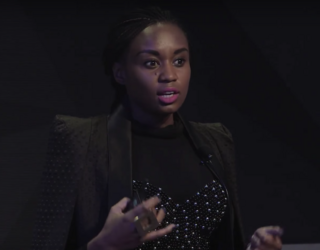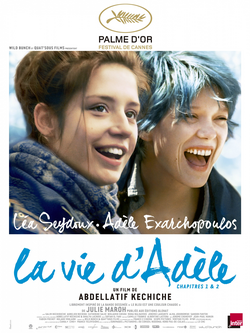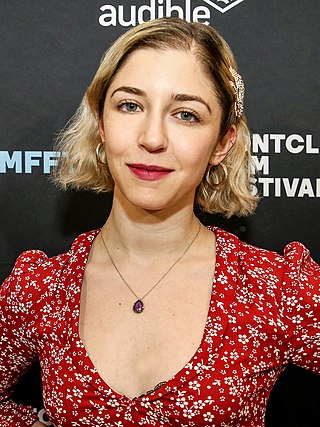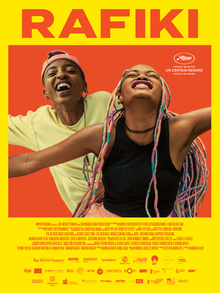Related Research Articles

Cinema of Africa covers both the history and present of the making or screening of films on the African continent, and also refers to the persons involved in this form of audiovisual culture. It dates back to the early 20th century, when film reels were the primary cinematic technology in use. As there are more than 50 countries with audiovisual traditions, there is no one single 'African cinema'. Both historically and culturally, there are major regional differences between North African and sub-Saharan cinemas, and between the cinemas of different countries.

Lesbian, gay, bisexual, and transgender (LGBT) people in Kenya face significant challenges not experienced by non-LGBTQ residents. Sodomy is a felony per Section 162 of the Kenyan Penal Code, punishable by 21 years' imprisonment, and any sexual practices are a felony under section 165 of the same statute, punishable by five years' imprisonment. On 24 May 2019, the High Court of Kenya refused an order to declare sections 162 and 165 unconstitutional. The state does not recognise any relationships between persons of the same sex; same-sex marriage is banned under the Kenyan Constitution since 2010. There are no explicit protections against discrimination on the basis of sexual orientation and gender identity. Adoption is restricted to heterosexual couples only.

Jeon Do-yeon is a South Korean actress. She won Best Actress at the 60th Cannes Film Festival, making her the first Korean actress to win an acting award at Cannes, and Best Performance by an Actress at the 1st Asia Pacific Screen Awards for her performance in Lee Chang-dong's 2007 film Secret Sunshine. Many young actresses have cited Jeon as a role model.

The cinema of Kenya refers to the film industry of Kenya. Although a very small industry by western comparison, Kenya has produced or been a location for film since the early 1950s when Men Against the Sun was filmed in 1952. Although, in the United States, jungle epics that were set in the country were shot in Hollywood as early as the 1940s.

Wanuri Kahiu is a Kenyan film director, producer, and author. She is considered to be “one of Africa's most aspiring directors, being part of a new, vibrant crop of talents representing contemporary African culture”. She has received several awards and nominations for the films which she directed, including the awards for Best Director, Best Screenplay and Best Picture at the Africa Movie Academy Awards in 2009 for her dramatic feature film From a Whisper. She is also the co-founder of AFROBUBBLEGUM, a media collective dedicated to supporting African art for its own sake.
Steven Markovitz is a South African film and television producer. He has produced, co-produced and executive-produced features, documentaries and short films. Steven has been producing and distributing for over 20 years. Since 2007, he has worked all over Africa producing documentary series' and fiction. He is a member of AMPAS, co-founder of Electric South & Encounters Documentary Festival and the founder of the African Screen Network.
Denis Nzioka is a Kenyan sexual and gender minority activist-author with a particular focus on LGBTIQ and sex workers' communities in Kenya and Africa. He has been instrumental in the formation of several organisations focused on queer and sex workers' rights while supporting regional organising around sexual diversity, bodily autonomy, and choice-expression.

Blue Is the Warmest Colour is a 2013 romantic drama film co-written, co-produced, and directed by Abdellatif Kechiche and starring Léa Seydoux and Adèle Exarchopoulos. The film follows Adèle (Exarchopoulos), a French teenager, who discovers desire and freedom when Emma (Seydoux), an aspiring painter, enters her life. It depicts their lesbian sexual relationship from Adèle's high school years to her early adult life and career as a schoolteacher. The film's premise is based on the 2010 graphic novel of the same name by Jul Maroh.

Carol is a 2015 historical drama romance film directed by Todd Haynes. The screenplay by Phyllis Nagy is based on the 1952 romance novel The Price of Salt by Patricia Highsmith. The film stars Cate Blanchett, Rooney Mara, Sarah Paulson, Jake Lacy, and Kyle Chandler. Set in 1950s New York City, the story is about a forbidden affair between an aspiring female photographer and an older woman going through a difficult divorce.

Isaac Maigua Mwaura is the current Government Spokesman of Kenya, a former Senator as well as a former Cabinet Administrative Secretary (CAS) - Deputy Minister in the Office of Prime Cabinet Secretary. Mwaura served as a Senator in Kenya's Senate under the Jubilee Party between 2017 and 2022 where he was nominated to represent Persons with Disabilities between 2017 and 2022. He was the third person to occupy that position under the Constitution of Kenya, 2010. He also served as member of Parliament in the National Assembly from 2013 to 2017 after being nominated by the Orange Democratic Movement Party to represents special Interest Groups. He was the first Member of the National Assembly (MP) and Senator in Kenya with albinism. He is a member of the United Democratic Alliance Party (UDA) which is the ruling party under the Kenya Kwanza Administration of President William Samoei Ruto.

Annabelle Attanasio is an American actress and filmmaker. She is best known as Cable McCory in the TV series Bull (2016–2018).
Patricia Wangechi Kihoro is a Kenyan singer, songwriter, actress, radio and reality television personality. She rose into prominence after she participated in the third season of Tusker Project Fame, where she became one of the finalists. In acting, she has appeared in a number of local productions like the 2011 film, Miss Nobody, which saw her being nominated in the 2012 Kalasha Awards for best lead actress in a film. In television production, she has been cast as a lead in Groove Theory, a musical drama and as a regular in Demigods, Changes, Rush and Makutano Junction. As a radio presenter, she has worked with One FM and Homeboyz FM. Patricia is a content creator, influencer and youtuber.

Judy Kibinge is a Kenyan filmmaker, writer and producer. She has produced, written and directed a number of films, best known are Something Necessary (2013), Dangerous Affair (2002), and Project Daddy (2004). She is also known for establishing Docubox, a documentary film fund for African filmmakers to help them produce and distribute their film. She released her first film, The Aftermath, in 2002 and critics have said that she uses her films to impart stories about Kenya, particularly those about women and others that are typically not told in mainstream Hollywood.

The Kenya Film Classification Board is a state corporation that operates under the Government of Kenya whose mandate is to "regulate the creation, broadcasting, possession, distribution and exhibition of films by rating them." The Board was founded in 1963 with the commencement of the laws outlined in the Films and Stage Plays Act of 1962 and has since involved itself in the rating and classification of films and television programmes. More recently, it has caused controversy by banning several films, such as the American box office success The Wolf of Wall Street, the Kenyan film Stories of Our Lives, Rafiki, and the 2015 film Fifty Shades of Grey based on the novel of the same name. The Board has also regulated television content, including advertisements.
This is a timeline of notable events in the history of non-heterosexual conforming people of African ancestry, who may identify as LGBTIQGNC, men who have sex with men, or related culturally specific identities. This timeline includes events both in Africa, the Americas and Europe and in the global African diaspora, as the histories are very deeply linked.

Rafiki is a 2018 Kenyan drama film directed by Wanuri Kahiu. Rafiki is the story of romance that grows between two young women, Kena and Ziki, amidst family and political pressures around LGBT rights in Kenya. The film had its international premiere in the Un Certain Regard section at the 2018 Cannes Film Festival; it was the first Kenyan film to be screened at the festival.
Corine Onyango is a Kenyan actress and radio presenter.
Likarion Wainaina, is a Russian–born Kenyan filmmaker. He is best known as the director of critically acclaimed shorts Between the Lines and Bait as well as most awarded Kenyan film in history, Supa Modo. In addition to directing, he is a cinematographer, editor, producer and actor.
Sheila Munyiva is a Kenyan actress and film director.
References
- 1 2 3 4 Mangat, Rupi (May 25, 2018). "Behind the scenes of 'Rafiki' at Cannes". The East African . Retrieved October 7, 2020.
- ↑ de Rochebrune, Renaud (May 16, 2018). "Cinéma : " Rafiki ", amour et censure à Nairobi". Jeune Afrique (in French). Retrieved October 7, 2020.
- ↑ Darling, Cary (May 9, 2019). "Kenyan gay life comes into focus in 'Rafiki'". Houston Chronicle . Retrieved October 7, 2020.
- ↑ Hornaday, Ann (May 6, 2019). "Movie about teenage girls in love is a breakthrough for Kenyan filmmaker". The Washington Post . Retrieved October 7, 2020.
- ↑ "Fespaco: Banned lesbian love story Rafiki wins award". BBC News. March 3, 2019. Retrieved October 7, 2019.
- ↑ Adeoye, Aanu; Odutayo, Damilola (March 4, 2019). "Actress in banned lesbian film 'Rafiki' wins award". CNN . Retrieved October 7, 2020.